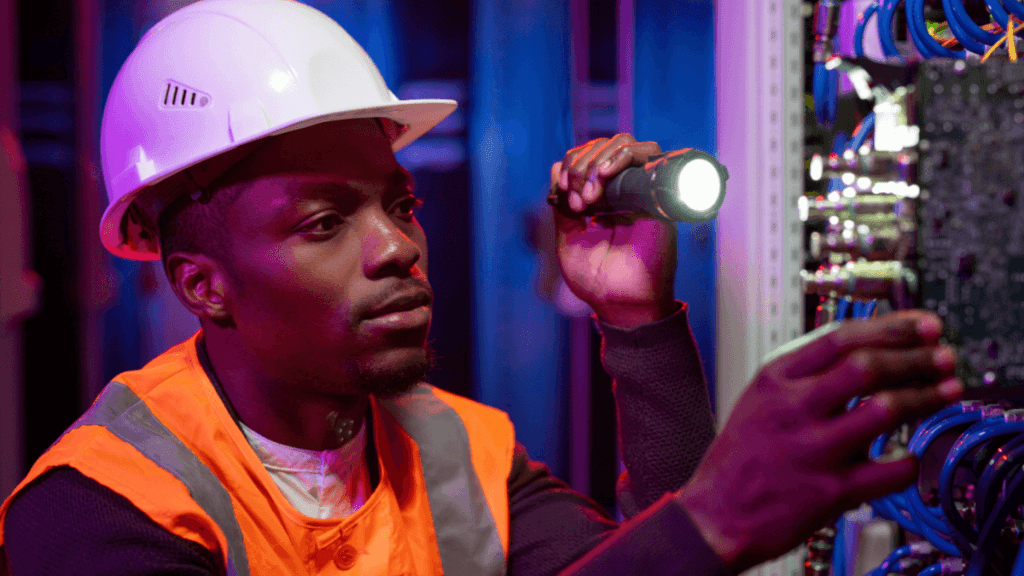Electricians are critical to the smooth running of electrical systems that power our homes, businesses, and industries. Whether you’re a beginner in the trade or an experienced professional, there are several essential skills that can help you become successful and advance in your career. These skills range from technical knowledge to soft skills, all of which contribute to ensuring safety, efficiency, and quality in electrical work.
Here are the key skills every electrician should master:
1. Strong Knowledge of Electrical Systems
- Understanding the Basics: An electrician’s foundation lies in a deep understanding of electrical systems. This includes the ability to comprehend electricity principles, power distribution, and how electrical components work together.
- Reading Blueprints and Schematics: Electricians must interpret blueprints and electrical diagrams accurately to ensure the correct installation and repair of systems.
- Staying Updated: As technology advances, so do electrical systems. It’s crucial to stay informed about new technologies, electrical codes, and best practices.
2. Technical Proficiency with Tools and Equipment
- Mastering Hand Tools: Electricians regularly use tools like pliers, wire cutters, strippers, and screwdrivers. Proficiency with these basic tools is a must for any electrician.
- Power Tools and Testing Devices: In addition to hand tools, electricians must be comfortable using power tools like drills, saws, and diagnostic equipment such as multimeters and insulation testers.
- Familiarity with New Equipment: Keeping up with the latest tools and technology can enhance efficiency and precision in your work.
3. Understanding of Electrical Safety
- Adherence to Safety Standards: Electrical work can be hazardous, making safety a top priority. Familiarity with electrical codes and safety standards is crucial for ensuring the protection of both workers and property.
- Using Personal Protective Equipment (PPE): Electricians should always use PPE such as insulated gloves, goggles, and face shields to avoid electrical hazards.
- Hazard Identification: Recognizing the risks associated with electrical work—such as short circuits, fire hazards, and electrical shocks—is essential for preventing accidents.
4. Troubleshooting and Problem-Solving Skills
- Diagnosing Electrical Issues: One of the key skills electricians must have is the ability to identify problems within electrical systems, whether it’s a malfunctioning circuit, faulty wiring, or equipment failure.
- Critical Thinking: The ability to think critically and logically in high-pressure situations is necessary to pinpoint the root cause of issues quickly.
- Efficient Solutions: Once a problem is identified, electricians must find the most effective solution to fix the issue promptly.
5. Attention to Detail
- Precision in Installation: Electrical systems are complex, and small errors can lead to major problems. A high level of attention to detail ensures that each wire, fuse, and connection is installed correctly.
- Following Codes and Schematics: Accuracy in following installation instructions and electrical codes ensures that systems function safely and efficiently.
6. Customer Service and Communication Skills
- Clear Communication with Clients: Whether explaining the cause of an issue or discussing project details, electricians need strong communication skills to relay complex information in an easy-to-understand manner.
- Professionalism: Maintaining a professional demeanor, being punctual, and adhering to agreed-upon schedules is key to establishing trust with clients and contractors.
- Interpersonal Skills: Interacting with clients, team members, and other professionals in a friendly and respectful way is critical to success in the field.
7. Physical Stamina and Dexterity
- Physical Demands: Electricians often work in tight spaces, at heights, or under challenging environmental conditions. Physical stamina is needed for lifting equipment, climbing ladders, or bending for extended periods.
- Manual Dexterity: Electricians need excellent hand-eye coordination and fine motor skills to work with small components like wires, connectors, and circuit boards.
8. Project Management Skills
- Coordinating Tasks and Timelines: They are often responsible for overseeing projects, whether it’s a small home renovation or a large commercial installation. Being able to manage tasks, schedules, and resources is crucial.
- Budget Management: Electricians need to be able to estimate costs, manage budgets, and ensure that the project stays on track financially.
- Team Coordination: Often working with other contractors or subcontractors, they must collaborate and manage teams to ensure projects are completed on time and within specifications.
9. Knowledge of Green Energy Solutions
- Energy-Efficient Technologies: As more homeowners and businesses focus on sustainability, electricians need to be familiar with energy-efficient technologies like LED lighting, solar panels, and energy-efficient appliances.
- Renewable Energy Systems: Electricians should understand how to install and maintain renewable energy systems, such as solar power or wind energy, to meet growing demand for green energy solutions.
- Smart Home Integration: With the rise of smart homes, electricians should be knowledgeable about integrating automation systems and energy-saving technologies into residential and commercial buildings.
10. Adaptability and Continuous Learning
- Embracing New Technologies: The electrical industry is constantly evolving. Electricians must be adaptable and open to learning new techniques, tools, and technologies that can improve their work.
- Certifications and Training: Continuing education, whether through certifications or on-the-job training, helps electricians stay relevant and competitive in a fast-paced field.
11. Time Management Skills
- Prioritizing Tasks: Electricians often work on multiple projects at once and must prioritize tasks to meet deadlines and client expectations.
- Staying on Schedule: Good time management ensures that projects are completed within the given timeframe, reducing stress and improving productivity.
- Efficiency in Task Completion: Effective time management also leads to increased efficiency, allowing electricians to complete more jobs in less time without compromising quality.
Check also: Electrician Salary in South Africa: How Much Can You Earn?
To become successful, it’s essential to master a combination of technical and soft skills. A strong foundation in electrical systems, safety protocols, and troubleshooting is key to performing high-quality work. In addition, the ability to communicate effectively, pay attention to detail, and manage projects will ensure that electricians can meet the diverse demands of the job.
By continuously learning and adapting to new technologies and industry changes, they can position themselves for long-term career growth. With the right set of skills, electricians play a crucial role in maintaining and enhancing the electrical systems that power our modern world.
Related: Essential Computer Skills Every Job Seeker Needs in 2025




